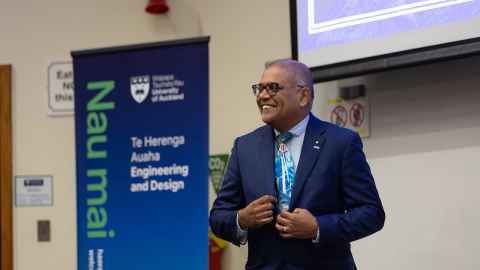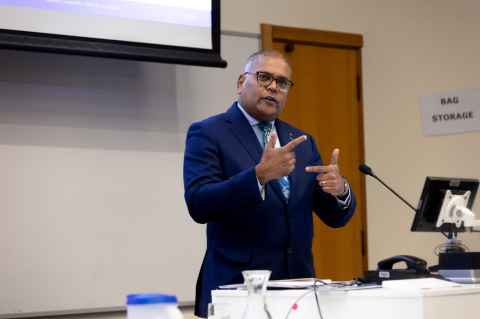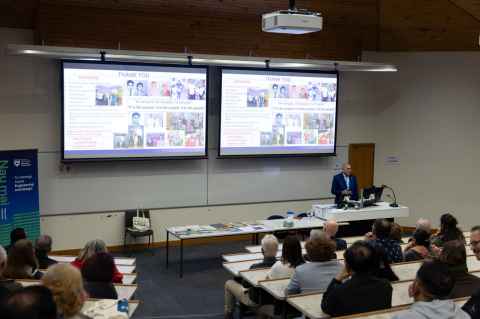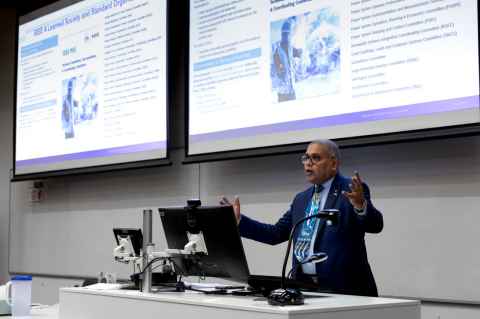Nirmal Nair: powering a legacy in New Zealand’s energy future
15 August 2025
Professor Nirmal Nair’s achievements in electrical energy systems continue a long family tradition of scholarship and service.

Since arriving in New Zealand in 2004, Professor Nirmal Nair has helped shape the future of the country’s electricity landscape.
One of New Zealand’s leading experts in smart grids and renewable energy integration, Nair has published more than 300 papers, supervised over 200 students, and helped secure nearly $12 million in external funding across almost 70 research projects.
"My journey has been shaped by the people, places and opportunities I’ve encountered along the way," he says. "It’s a story that spans continents, generations and decades of work in electrical power systems, and it’s deeply personal to me."

On a winter evening in July, colleagues, friends, whānau and former students gathered in an engineering lecture theatre to hear Nair deliver his inaugural professorial lecture. The room was filled with people whose paths he has crossed over decades of research and collaboration, including his partner and fellow professor, Viji Sarojini, and the Dean of Engineering and Design, Dr Richard Clarke.
In 2006, his expertise first came to public attention when a major blackout swept through Auckland, forcing the cancellation of university exams.
Nair recalled how the outage exposed vulnerabilities in the city’s power supply, and how he and his colleagues responded by preparing a detailed technical submission to the Electricity Commission and Minister of Energy, outlining grid risks and highlighting long-term infrastructure needs.
Their recommendations would later inform nationwide strategic upgrades, helping plan more resilient energy infrastructure for New Zealand.

Nair says his drive to understand complex systems and pursue a meaningful career was rooted in his upbringing.
Born in Kerala, India, to a military engineer father and a homemaker mother, he grew up surrounded by inspiring changemakers.
My work, much like the electrical power systems I study, is powered by those who came before me and built to flow forward.
During the lecture, he drew a timeline tracing his matrilineal ‘Marumakkathayam’ family history alongside the introduction of electricity in India – a demonstration of electric light bulbs in Calcutta in 1879 – and highlighted remarkable family figures from the same era.
Among them were his maternal great-grandfather, Kunnath Janardhan Menon, a journalist and prolific writer in Malayalam, and his maternal grandmother, Lakshmi Kutty Amma, who fought for India’s Independence alongside Mahatma Gandhi and was imprisoned for civil disobedience. Various writers, scholars and engineers from the same era also indirectly inspired his work today.
Growing up in a military family, Nair moved frequently and learned several languages along the way. He speaks seven now, including Malayalam, Hindi, Tamil, Gujarati, Punjabi, Spanish and English. He’s also actively learning New Zealand Sign Language, te reo Māori, “the Kiwi way of speaking” and, he jokes, the language of dance.

Nair’s frequent movements in youth shaped his career path in adulthood, starting with teaching roles in Vallabh Vidyanagar and Morbi, India, in the early 1990s, then a prestigious engineering college in College Station, Texas, US, and eventually, Waipapa Taumata Rau, University of Auckland.
Today, he directs the University’s Power Systems Group, whose teaching and research activities will inform future energy systems. Current projects include the Future Architecture of the Network programme, which explores challenges in decarbonising the electricity network, and QuakeCore, which examines how New Zealand can make its infrastructure more resilient as transport electrifies.
My journey has been shaped by the people, places and opportunities I’ve encountered along the way... it spans continents, generations and decades of work in electrical power systems, and it’s deeply personal to me.
Earlier this year, he was named a Fellow of the Institute of Electrical and Electronics Engineers, a prestigious global honour held by just over 7000 people worldwide, and only a handful in New Zealand. He was also appointed a Fellow of the Asia Pacific Artificial Intelligence Association, recognising his contributions at the intersection of energy, digital innovation and sustainability.
Nair ended his lecture by reflecting on the people and ideas that have shaped his journey.
“I was reminded that my work, much like the electrical power systems I study, is powered by those who came before me and built to flow forward through the lifelong learners I have the privilege of engaging with."
Media contact
Media adviser | Jogai Bhatt
M: 027 285 9464
E: jogai.bhatt@auckland.ac.nz